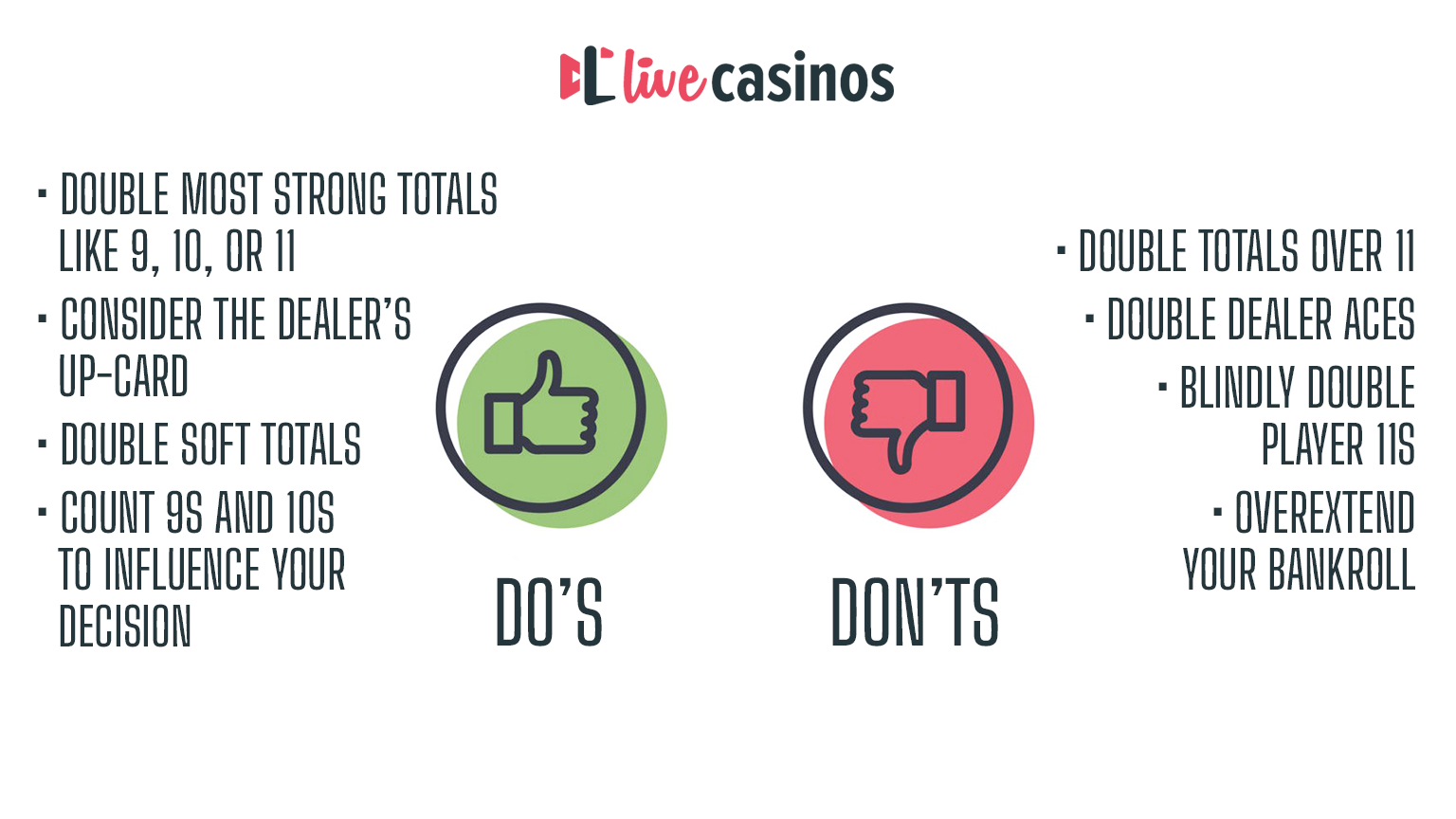Doubling down is one of the four fundamental player moves in blackjack, next to Hit, Stand, and Split. Almost every blackjack table out there allows you to take this option, barring rare exceptions and niche variants. However, the rules for when you can Double Down in blackjack vary from table to table.
Firstly, you can only Double Down immediately after you draw your first two cards. This means you can’t Hit and then double unless the table is using special rules.
You can’t Double Down if you draw an Ace and a 10-value card as your hole cards. In this case, you win with a natural blackjack and don’t even get a chance to double.
Lastly, some table rules allow you to Double after a Split while others don’t. Make sure to check the in-game rule panel before playing.
Moreover, drawing a single card after Doubling is not optional. You have to draw one card, and one card only, even if it means going over 21.
When to Double Down: Optimal Scenarios
Now that we know when this option is available, another question arises – when to Double Down in blackjack?
The full answer depends on many factors such as the house rules, the card count, and your goals and strategies. However, there are several situations in which Doubling Down is always a good idea:
- When you have a hand total of 11 – 10s and Face cards all count as 10s in blackjack, which means 10 is the most probable value to appear on a card. A hand total of 11 puts you exactly one card away from a perfect 21, which makes Doubling a good idea. However, you should still avoid doing so if the dealer is showing an Ace.
- Hand total of 10 – Hole cards with a total value of 10 are not as good as 11, but they’re the next best thing. If the dealer is showing anything except 10 or Ace, Doubling is a good idea.
- Hand total of 9 – Doubling can be a smart play if the dealer is showing a weak card such as 3, 4, 5, or 6.
- Soft 16, Soft 17, or Soft 18 – Doubling soft totals can be a good move in certain scenarios because the Ace lessens the risk of going over 21. However, you don’t want to Dobule soft 19s, 20s, or 21s because the extra card is likely to produce a weaker hand.
You can use the table below for a quick reference whenever you want to know when to Double while playing blackjack.
When Not to Double Down
Conversely, Doubling should be completely avoided in certain situations. While the specifics may depend on other factors, here are some situations in which you should never Double:
- When you have a Hard 12 or higher – Hard totals of 12 or higher mean that you’re just one card from going bust. Increasing the stakes is a bad idea.
- Hard totals of 4 of 5 – These are some of the weakest hole cards you can get. While such a hand can be salvaged, you would probably need at least 2 additional cards to stand any chance of winning.
- When the dealer is showing an Ace – A dealer with an Ace is a dangerous sight that obviously puts you at a disadvantage. The only exception is if your total is also 11.

Doubling Down After Splitting
One of the most common rule inconsistencies in blackjack concerns Splitting. Specifically – can you Double Down on a split hand?
Well, it depends on the table rules.
As a reminder, Splitting allows you to turn a pair of same-value cards into two separate hands. Much like a Double, it requires you to increase your stake accordingly. In most cases, any pair of cards can be Split, although Aces are often the exception.
Some tables will allow you to Dobule one or both of the resulting hands, which effectively quadruples the initial stake of the round.
Unfortunately, though, this is not allowed in most live dealer versions of blackjack. Exceptions exist, but they’re by no means the norm.
Even when it’s allowed, most tables specifically state that you can’t Double a pair of split Aces. In fact, you generally can’t Split Aces at all, but that’s another issue entirely.
Casino Rules and Variations
Although most modern online games of Twenty-One use similar rulesets, there are variations out there that alter when, how, and whether you can double down.
Here are some of the most common variations of Double Down rules in blackjack:
- Restricted doubling – Some tables only allow you to Double certain hand totals while disallowing others. For instance, you may not be able to do so on a hand total of 10 or 11. Although rare, such variations are best avoided because they limit the number of options available to the player.
- Triple Down – A rare variation that allows you to triple your bet instead of doubling it. This rule is generally player-friendly, but you should be wary of certain tradeoffs such as decreased odds.
- Doubling after a Split – While most tables don’t allow you to Double split hands, some do. This is another favourable rule that is unfortunately not that common these days.
- Doubling after hitting – Sometimes, players can be allowed to Double even after taking a Hit or more. Both variants are relatively common.
Note that rule variations such as these impact the RTP of the game you’re playing. This means that even the slightest deviation can have a massive impact on your long-term profits. Always check the rules of the specific game you’re playing before wagering any money. It’s simple to do and it can save you a lot of headaches down the line.
Advanced Tips for Doubling Down
The tips on when to Double Down we provided above largely align with basic blackjack strategy. This means that we outlined the statistically optimal moments to make this move, assuming it’s the first hand played with the current shoe.
However, advanced players may be interested in some more in-depth information.
Generally, Doubling is used to press a perceived advantage over the dealer. The idea is simple – if your hand appears to be stronger than the dealer’s, you want to leverage it and win more. As you may or may not know, though, the current shoe penetration can change whether a hand is considered strong or not.
For example, let’s say your count is telling you that a lot of 10-value cards have already been removed from the game. This means that the house advantage is bigger than it is by default. In such circumstances, you may find it best to avoid Doubling even when basic strategy calls for it.
Speaking of which, card counting may impact your decision on whether to Double or not. For instance, a positive count implies that there are more high-value cards in the shoe and that you should be playing more aggressively. You could decide to Double a total of 7 or 8 if you know that the dealer is likely to bust or that you’re likely to win with a 17 or 18.
On the flip side, let’s imagine your count is telling you that there are more low cards remaining in the shoe. In this case, you should consider not Doubling even if your strategy chart is telling you otherwise. A prevalence of low cards means that you’re more likely to end up with a low total after drawing just once, which can cost you.
Common Misconceptions About Doubling Down
For better or worse, blackjack Double Down rules are often misunderstood by beginners and even some veteran players. There’s a lot of conflicting information out there, so we’ll try to clear some of it up.
Let’s go through some common mistakes and misconceptions players have when it comes to doubling in blackjack:
- Doubling Down is always a high-risk move – It may seem like increasing the stakes is always riskier than not doing so. However, players who believe this are forgetting that not doubling means that you’re not taking advantage of a favourable position. Sometimes, a missed opportunity can cost you as much as a lost bet.
- Doubling Down has no effect on house advantage – Many newbies believe that Doubling is a nice way to increase your payout that doesn’t actually affect the long-term RTP of blackjack. This is simply untrue – the optimal moves for blackjack have been calculated a long time ago as basic strategy charts, and they include Doubling Down.
- You should always double on 11 – This is a very common belief because the player technically still has an advantage no matter the dealer’s up-card. However, the optimal strategy states that you should not double an 11 if the dealer is showing an Ace. The reasoning is simple – Doubling gives you a statistical advantage of +13% from the baseline. However, simply Hitting this hand offers a +14.75% advantage.









































 Roulette
Roulette
 Blackjack
Blackjack
 Baccarat
Baccarat
 Poker
Poker
 Sic Bo
Sic Bo
 Dragon Tiger
Dragon Tiger
 Game Shows
Game Shows  Top 5 Games
Top 5 Games  See more
See more  Roulette Casinos
Roulette Casinos  Low Limit
Low Limit  High Limit / VIP
High Limit / VIP  Exclusive
Exclusive  How to Play
How to Play  Basic Strategy
Basic Strategy  Top Tips
Top Tips  FAQ
FAQ  Blackjack Casinos
Blackjack Casinos  Baccarat Casinos
Baccarat Casinos  Bonuses
Bonuses  Poker Casinos
Poker Casinos  Game Providers
Game Providers  Sic Bo Casinos
Sic Bo Casinos  Dragon Tiger Casinos
Dragon Tiger Casinos  Credit and Debit Card
Credit and Debit Card  e-Wallet
e-Wallet  Cryptocurrency
Cryptocurrency  Bank and Checks
Bank and Checks  Pay by Phone and SMS
Pay by Phone and SMS  See more
See more  How-To Guides
How-To Guides  Top Lists
Top Lists  In-Depth
In-Depth  Strategy
Strategy  Casino & Games
Casino & Games  Insight
Insight  News
News  Promotions
Promotions 
 Guide to Live Casinos
Guide to Live Casinos  Top 10 Live Casino Tips
Top 10 Live Casino Tips  Studio Locations
Studio Locations  FAQ & Help
FAQ & Help  Meet The Dealers
Meet The Dealers  Our Awards
Our Awards  How We Rate
How We Rate  Responsible Gambling
Responsible Gambling 




























 ENG
ENG 








 Facebook
Facebook
 Pinterest
Pinterest
 Twitter
Twitter
 LinkedIn
LinkedIn
 Copy Link
Copy Link 



















